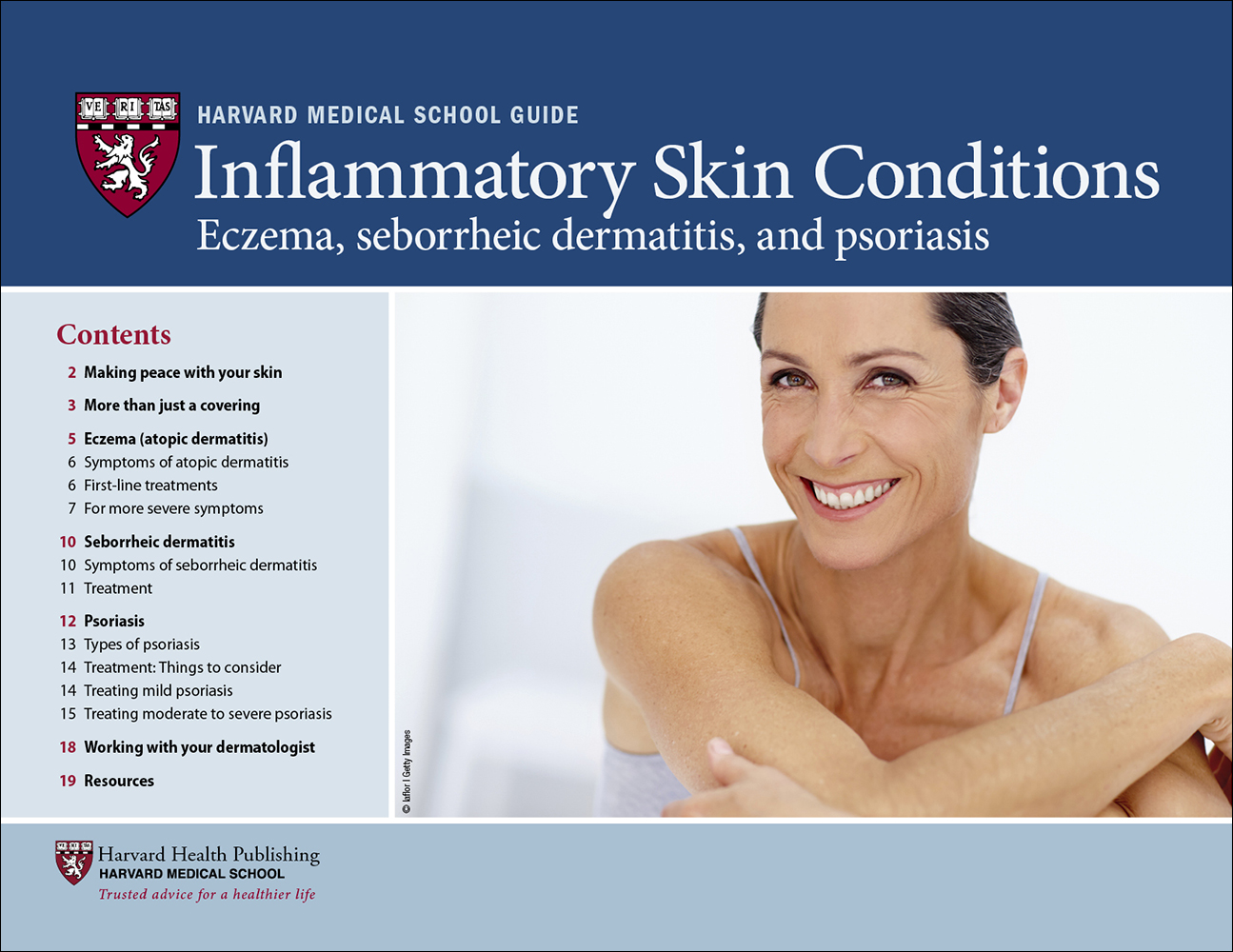Taming the chronic inflammation of psoriasis
Lotions, medications, and light and laser treatments can help.
 Chronic inflammation in the body does not always make itself apparent. It may produce no symptoms, but still be quietly causing damage. Such quiet inflammation may be encouraging the buildup of plaques of atherosclerosis in your arteries, or driving your thyroid gland to become underactive or overactive.
Chronic inflammation in the body does not always make itself apparent. It may produce no symptoms, but still be quietly causing damage. Such quiet inflammation may be encouraging the buildup of plaques of atherosclerosis in your arteries, or driving your thyroid gland to become underactive or overactive.
Psoriasis is different, however. In this chronic inflammatory disease, immune cells attack the skin, causing visible, uncomfortable lesions. It is an autoimmune condition: the immune system, which is your defense against foreign microbes and chemicals, mistakenly starts attacking your own tissues.
Types of psoriasis
There are numerous kinds of psoriasis. Plaque psoriasis is by far the most common, accounting for 90% of cases. It causes thick red, raised patches of skin covered in silvery or white scales. These plaques can develop anywhere, but they most often occur on the elbows, knees, scalp, or lower back. Plaques may ooze or itch (but scratching or picking at them makes them worse, so try to leave them alone).
Other types of psoriasis include these:
Guttate psoriasis. This is the second most common type of psoriasis. It usually appears as small red, scaly bumps on the arms, back, chest, or abdomen.
Inverse psoriasis. This shows up in body creases: between the buttocks, under the arms, or near the genitals. The lesions may look smooth and red.
Nail psoriasis. This type of psoriasis causes yellowed, pitted, or crumbling fingernails.
Pustular psoriasis. This type creates painful pus-filled blisters on the hands and feet. In rare cases, it can be life-threatening.
Psoriasis causes
As with most autoimmune conditions, we don’t know exactly what triggers psoriasis. "There is no single factor that can predict if someone will develop psoriasis. It is a complex interplay between an individual’s genetic predisposition, the immune system, and environmental triggers," explains Dr. Megan Noe, a dermatologist with Harvard-affiliated Brigham and Women’s Hospital.
Scientists have, however, unraveled the cascade of events that creates psoriasis symptoms. For example, in plaque psoriasis, certain white blood cells (T-helper lymphocytes) enter the topmost layer of skin (the epidermis) and produce inflammatory chemicals that speed up cell growth so much that dead and dying skin cells accumulate on the surface of the skin, forming plaques.
Complications
If you have psoriasis, you may be at risk for developing another health problem. For example, one in three people with psoriasis will develop psoriatic arthritis. This condition causes pain, stiffness, or swelling in the joints of the fingers, toes, or spine, or at the junctions of bones and tendons or ligaments.
Other conditions may develop as well. "People with severe plaque psoriasis — having plaques on more than 10% of the body — have been shown to have higher rates of hypertension, diabetes, chronic kidney disease, certain types of liver disease, and coronary artery disease," Dr. Noe says.
What’s the link? "The hypothesis is that the inflammation seen in the skin might be affecting other internal organs as well," Dr. Noe says. "Additional research is under way to better understand these other conditions and how they are affected by psoriasis treatment."
Treatment options
Dr. Noe says that topical steroids, gentle exfoliant lotions, and emollients that keep the skin hydrated are very effective for mild psoriasis. "Some are available over the counter and some require a prescription," she notes.
Other psoriasis treatment options include ultraviolet light (phototherapy), laser therapies, or vitamin A (retinoid creams).
Stronger therapies are often needed for moderate-to-severe psoriasis. Your doctor might prescribe immunomodulating drugs (to suppress the immune system) or biologics (which target proteins involved in inflammation). These more powerful treatments have become available in recent years, thanks to medical research, and can make a huge difference in people’s lives.
COVID-19 and psoriasis
The pandemic has had a big effect on people with psoriasis. "It’s made it difficult for many patients to see their doctor to continue psoriasis treatments or talk about starting new medications," Dr. Noe says. "Many patients had interruptions in phototherapy during the pandemic when offices closed. Also, many patients stopped taking their medications, including pills and injections." Some people stopped because they worried the medicines might make them more susceptible to COVID-19, and some because they lost their jobs and couldn’t afford the medicines.
For the latest recommendations about the risks of COVID-19 for people with psoriasis, Dr. Noe recommends visiting the website of the National Psoriasis Foundation (/npf).
"The foundation has established a COVID-19 task force of experts in dermatology, rheumatology, epidemiology, infectious diseases, and critical care, and is doing an excellent job of providing clear recommendations and guidance for people with psoriasis. It’s all available on their website," Dr. Noe says.
"I encourage all people with psoriasis to follow the task force’s recommendation of getting vaccinated with an mRNA vaccine [from either Pfizer or Moderna] as soon as possible, if they haven’t already done so," says Dr. Noe. She also advises patients with psoriasis to talk to their dermatologist about any questions or concerns about it. "Don’t hold off because you’re worried; be proactive and get the information you need."
Image: © SurfUpVector/Getty ImagesAbout the Author

Heidi Godman, Executive Editor, Harvard Health Letter
Disclaimer:
As a service to our readers, Harvard Health Publishing provides access to our library of archived content. Please note the date of last review or update on all articles.
No content on this site, regardless of date, should ever be used as a substitute for direct medical advice from your doctor or other qualified clinician.
















